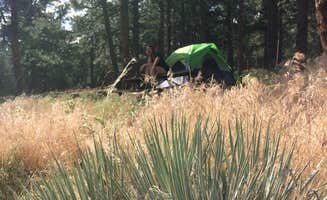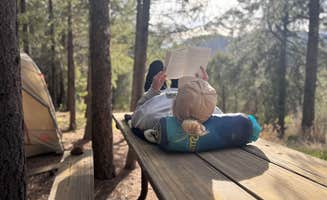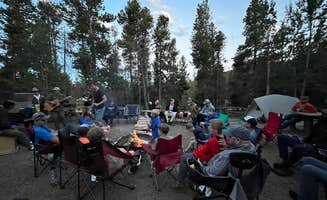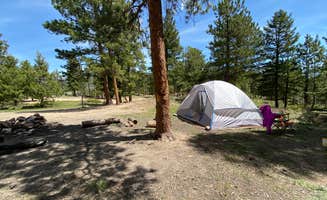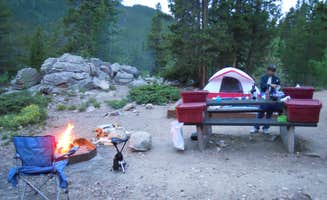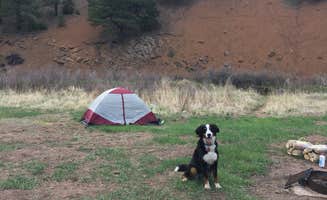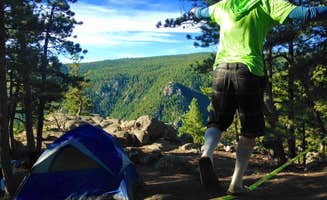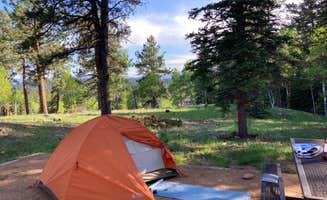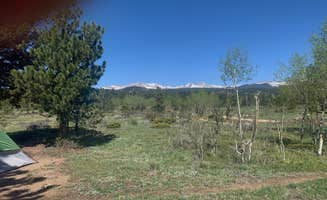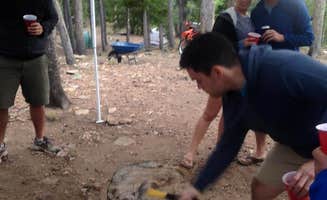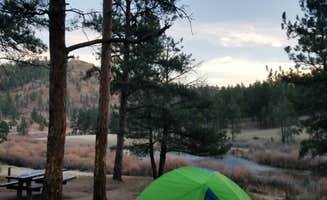Primitive camping options near Denver create unique overnight opportunities in Colorado's Front Range wilderness. Dispersed campsites typically sit at elevations between 7,000-9,000 feet with dramatic daily temperature fluctuations even in summer. Most sites require visitors to store food properly due to bears and other wildlife active throughout the camping season from May through October.
What to do
Fishing access points: Fall River Reservoir offers excellent fishing opportunities with quick limits possible. "With perfect views of the mountains and streams in all directions. Our tent was literally right next to a stream of water which was good fishing as me and my friend caught our daily limit of fish very quickly the only day we were there," notes Larry S. about the Fall River Reservoir Dispersed Camping Trail.
Stargazing spots: Several remote sites provide unobstructed night sky viewing, though construction activities can impact some locations. "You can't beat the view. We sit at the edge of the boulders and watch the sunset," writes K.R. about Staunton State Park Campground.
Creek exploration: Many sites feature streams perfect for cooling off during hot days. "There is a beautiful creek right across the road that is great for filtering water and cooling off," explains Zack B. about Fall River Reservoir, adding "The reservoir itself is gorgeous. There are a few falls that flow in and some good bouldering routes towards the back."
What campers like
Quick escapes: Sites within 45-60 minutes of Denver provide convenient weekend camping. "This was a close 1 night get away spot. Pretty area, the sites we saw were numbered," explains Nicci M. about Gordon Gulch Dispersed Area.
Aspen groves: Fall color changes create spectacular settings at higher elevations. "In the Fall this park is just stunning with aspen leaves all different colors so it brings a bit of solitude in nature too even with all the people in the park," notes Hayley K. about Staunton State Park.
Privacy between sites: Campers appreciate separation between established sites. "The campsites are well maintained and quite spread out from one another. So although there was a group of scouts, a group of friends, and a bigger youth group who all hiked in, it did not feel crowded or noisy," writes Jessica K. about Sawmill Hiker Campground.
What you should know
Vehicle requirements: Many dispersed areas require appropriate vehicles. "Note you will need a 4 x 4 vehicle to reach this campsite as the road starts to get bumpy due to boulders and rocks on the road towards the end of the end road. So be prepared for a little longer and bumpy 45 minute ride up to the top," warns Larry S. about Fall River Reservoir.
Early arrival necessary: Most sites fill quickly on weekends. "We tried to drive in Friday night and all the campsites were full so some kind people let us share theirs. I'd suggest getting their early to get a good spot!" advises Gillian S. about Winiger Ridge at Gross Reservoir.
Water challenges: Campers must either carry water or filter from natural sources. "The water spigots are at the base as well and not at or near the sites - 1/2 mile from the farthest site, Site 19. We had to carry up jugs and refill at night," mentions K.R. about Staunton State Park.
Tips for camping with families
Wagon access: Some walk-in sites allow wagon use for hauling gear. "When camping with a whole posse of kids, we used a wagon to haul all that crap up. No problems with the wagon getting stuck. Trails are very clear," shares K.R. about their experience at Staunton State Park.
Boulder exploration: Kids enjoy natural features for climbing and play. "And, behind 19 are rocks and boulders. You could scramble up with or without kids (my kid was 2 and climbed with some help) and explore for about an hour just by the site," adds K.R. about Staunton Park.
Wildlife encounters: Prepare children for possible bear sightings. "The second day staying there we ran into a bear and scared him off. Two hours later he can back and we scared him off again. He's afraid of humans but he did try to get into the car while we were sleeping," warns Ben O. about Allenspark Dispersed Camping.
Tips from RVers
Limited RV access: Most dispersed sites accommodate small vehicles only. "Gnarly ass road, not for trailers/sedans. Camp sites are nice, but except for a few (~5) the rest require a serious climb (drive) up a gnarly hill with deep ruts. I wouldn't try this with a camper/RV, or anything that doesn't have high clearance and power," cautions Graham S. about Winiger Ridge.
Established alternatives: Look for designated campgrounds with RV accommodations. "The sites are for tent/RV and have electric hookups. Beautiful area. There's a few playgrounds within the campground and park area, with access to trails to the lake, a boat launch and boat rental, equestrian stables, and archery," shares Kevin M. about Bear Creek Lake Campground.
Partial hookups: Many sites offer limited services. "Only drawback might be the bathrooms have no night lighting and you have a dumping station instead of sewage hookups. Also water is available but not at the site," adds Kevin M. about Bear Creek Lake.


